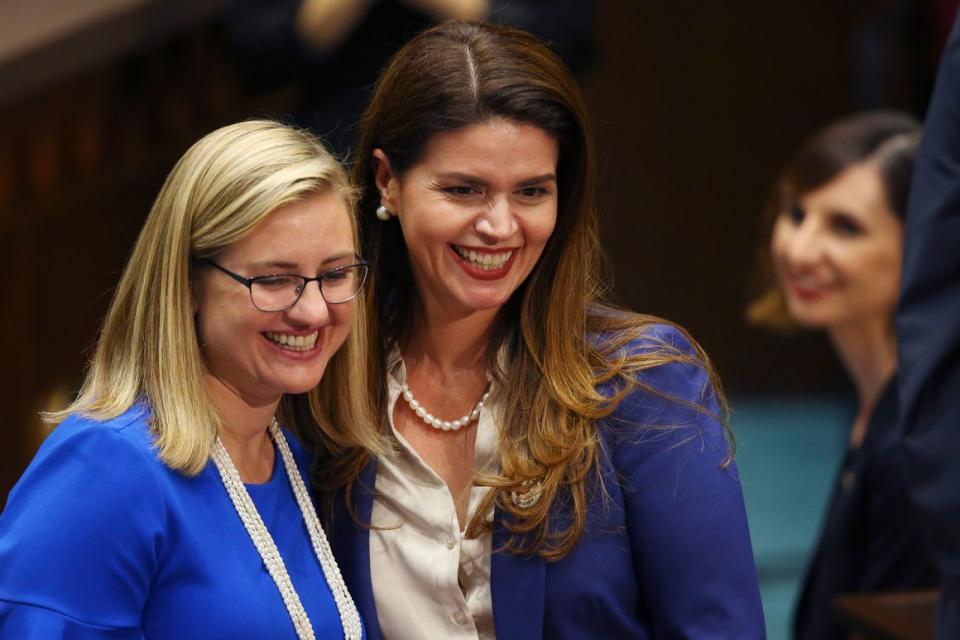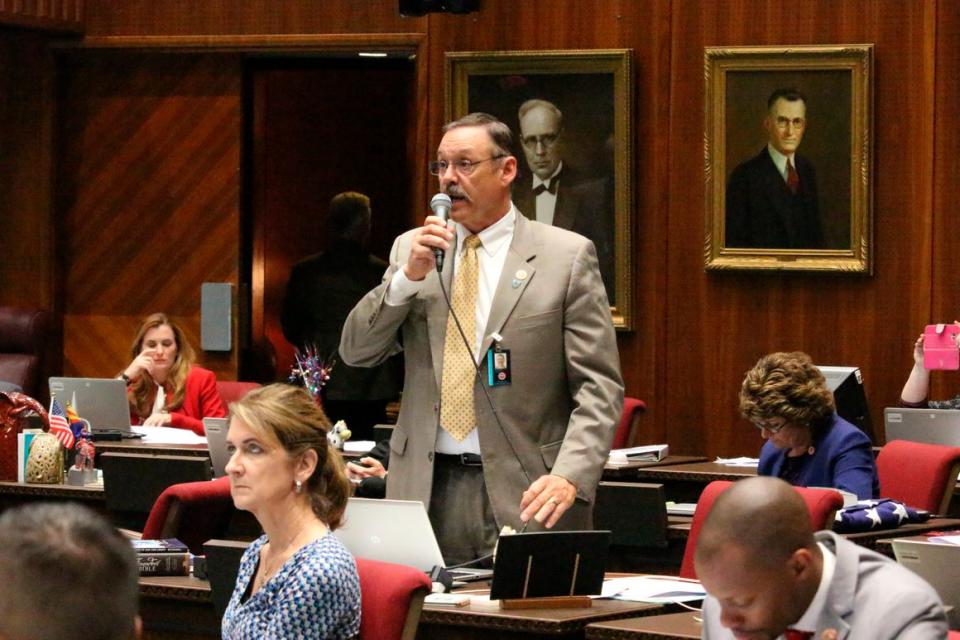In Arizona, Liberty Trumps the Virus Fight. How's That Going?
SCOTTSDALE, Ariz.—Carsten Salon in Phoenix is still open for business, though it’s only scheduling select clients with a curtailed staff of three stylists. “You cannot stand six feet away,” its owner told me over the phone after finishing up with a client on Wednesday morning. “I can either sit at home, or I can come here.”
North Scottsdale Pawn, which has been operating since 1966, has seen fewer customers than normal, “but we’re open for business,” I was told when I called after they opened at 9 a.m.
Pawn shops and salons are considered among the essential Arizona public services allowed to stay open in the Covid-19 pandemic. So are golf courses, dry cleaners, nail salons and spas.
The statewide executive order that went into effect Tuesday imploring citizens to stay home until April 30 is among the most relaxed in the nation. In the national argument about saving lives versus saving livelihoods, the Grand Canyon State is ground zero for the open-door approach, keeping businesses as active as possible while leaving it up to citizens to police their own health.
As other states have put aggressive lockdowns into place and ordered individuals to stay in their homes, Arizona has taken a more incremental approach. It was on March 20 that two-term Republican Governor and former businessman Doug Ducey first ordered restaurants, bars, and gyms to close—but only in counties that had known cases of the virus. (The same day, neighboring California, which had already told restaurants to close statewide, told citizens to stay home for the indefinite future.)
Last night, Ducey ordered a statewide order to shelter in place, but framed it as a matter of “personal responsibility” rather than a mandate. The order leaves the option for huge swaths of the business community to remain open as usual. Nationally, Arizona, along with Florida, have come under fire from public health officials for bringing up the rear on the national response, putting their orders in place late and loosely. (Florida Governor Ron DeSantis issued his statewide order on Tuesday).
As Democratic governors around the country joust warily with Donald Trump’s White House, the argument in Arizona is playing out internally, between Ducey and the state’s Democratic mayors, who are irate that Ducey has used his executive authority to prevent them from taking more aggressive measures on their own. Backing the governor up, even urging him to relax further, have been the laissez-faire elected officials from Republican and libertarian strongholds that hold considerable sway over statewide government. To them, the pandemic is either an overblown crisis whose seriousness they question or an assault on their civil liberties.
Right now, Arizona has identified relatively few confirmed cases of Covid-19: over 1,400 as of Wednesday, along with 29 deaths. However, it has also ranked last in the nation for testing, meaning the data on the full spread of the virus is likely to be patchy at best.
Public health experts expect different parts of the country to be hit with different intensities; not every city is likely to become New York, which is now overwhelmed by severe cases. But the Arizona approach is raising questions about the limits of just how diverse our response should be—and at what point ideology should take a back seat to the demands of public health.
‘We don’t live in Communist China’
Ducey’s new order, called Stay Home, Stay Healthy, Stay Connected, attempts to weave a public health message with an ethic of individual responsibility. The goal, according to its text, “is to ensure that people maintain physical distance to the maximum extent feasible, while enabling essential services to continue, protecting people’s rights and slowing the spread of COVID-19 to the greatest extent possible.”
Among those businesses permitted to remain open are “professional and personal services” such as legal and accounting firms, along with banks, real estate appraisals and titling (which covers many pawn shops), and outdoor recreation activities. This has led critics to charge it’s endangering Arizonans who hold jobs that are far from essential; one example I heard several times is staff that need to wash golf balls on the state’s countless public and private courses. The most controversial exemption is for personal hygiene, which includes barber shops and salons, and even nail spas.

One point that has exercised critics: The order also forbids cities from implementing their own, more restrictive orders. In much of the country, cities have had leeway to react more urgently, since their denser populations can pose a high contagion risk. One of the most vocal critics of Ducey’s new order is Mayor Kate Gallego of Phoenix, who is urging the governor to winnow down the list of truly essential services, and complains that he has prevented the largest city in the state from looking after its citizens its own way.
“I think we need to focus more on stopping the spread of Covid-19 and less on the quality of our nails,” she told me. “And I say that as someone whose nails look terrible right now.”

She also says she worries that businesses deemed essential but decide on their own to shut down might be deprived of government economic aid or loans. “I would not want a business to be ineligible for aid because they were deemed essential and so couldn't close.”
Her concerns put her squarely at odds with Ducey backers like Republican state Rep. Mark Finchem, who not only warns about the impact of a lockdown on the economy—“Many of the businesses that have had to furlough employees won’t be coming back” because they won’t be able to recoup their losses, he warns—but also sees restrictions as an assault on individual liberty.
“There is a level of hysteria that has popped up in these municipal leaders,” Finchem told me. “I also get the sense they are calling for martial law. We don’t live in Communist China.”

Finchem is a former police officer from Kalamazoo, Michigan, who moved to Arizona two decades ago and now represents Oro Valley, north of Tucson, and occupies the right. He describes himself as a member of the Oath Keepers, a militia-style group that is dedicated to defending the Constitution from what it considers a far too powerful federal government. (No stranger to controversy, he once wrote on his campaign website that the deadly Unite the Right white supremacist rally in Charlottesville, Virginia, in 2017 was in fact orchestrated by the "Deep State,” including Democrats and the media.)
Finchem falls squarely in the camp that worries the cure may be worse than the disease, and that a shutdown would do more damage in the long term to the economy and civil liberties than the outbreak. “Not everyone’s immune system reacts to this particular virus the same way,” he told me, citing a report he saw on Fox News. “For a lot of people, you just don’t know what is going to cause a mortal wound to your body.”
But Finchem says he’s comfortable with Ducey’s latest order because it addresses the public health threat, but “it is not overboard.” (“It is not in draconian mode,” he elaborated, “interfering with people’s civil liberties.”)

Others similarly wary of state control, however, wonder if Ducey’s stay-at-home order has already gone too far. “I could argue that the right to peaceably assemble is a constitutionally protected activity and therefore is an essential activity under this order,” state Rep. Kelly Townsend, a Republican from the conservative bastion of Mesa, told me. (Townsend, who once called vaccines “communist,” has toned down some of her rhetoric in recent weeks).
Then there’s the interpretation of those like Republican state Rep. Travis Grantham, who represents the Phoenix exurb of Gilbert, and insists that Ducey’s latest order changes nothing—and that’s just the way he likes it.
“It does not order the public to stay home and it does not order businesses to close,” he tweeted.
‘Just leave me alone’
Many longtime observers of politics will recognize the dynamic shaped by Arizona’s deep libertarian streak. U.S. Rep. David Schweikert, a Republican whose congressional district centers on Scottsdale, describes many of his constituents as “I’m not a traditional conservative, I am not a traditional liberal, just leave me alone.”
He explained Ducey’s conundrum to me this way: “How do you have a population that has embedded that substantial independent streak and then demand of them” where they can go and what they can do?
Ducey, for his part, does see the order as a big change. In a local television interview hours before the order went into effect Tuesday. “This is increased guidance in alignment with the CDC, the Centers for Disease Control … The state basically has shut down.”
When asked by the interviewer specifically about allowing proprietors of hair and nail salons to remain open, he responded, “The thing I want people to focus on is not so much the business side of this, but their personal responsibility on how they can help slow and flatten this curve.
“I wrote this order with guidance from subject matter experts. I’m confident we are making good decisions,” Ducey, who declined a request to be interviewed, told the local Fox affiliate on Tuesday. “As long as people follow it, we are going to get through this.”

U.S. Rep. Ruben Gallego, a Democrat who represents parts of Phoenix in Congress, says he can sympathize with the balance Ducey is trying to strike between addressing the public health crisis head on and responding to the concerns of his many supporters, including in the state Legislature, which is majority Republican. But he doesn’t agree that this is a time for political compromise.
“He wants to appease both the rational leaders and people saying ‘you are not being careful enough’ and not piss off his base of voters,” Rep. Gallego told me. “He wants to have it all ways. Unfortunately, I think it will cost people’s lives in Arizona.”
The approach here also alarms public health experts who worry about what will happen if Arizona doesn’t heed the painful lessons of the early virus hot spots on the East and West coasts.
“What's kind of happened recently with these state-level orders are that they have unfortunately become politicized,” Swapna Reddy, a professor at the College of Health Solutions at Arizona State University, told me. “If we're trying to address a public health problem, it's important to take a public health approach. And we are kind of already at a little bit of a disadvantage in my opinion because we have this patchwork approach.”

Reddy, who has been advising the Phoenix mayor, acknowledges that it is impossible to quantify the risk of designating so many questionable businesses as essential. “How do we determine scientifically if it is dangerous or if it's not dangerous or wise or unwise to have a nail salon or a hair salon open? We don't have those answers yet,” she said.
But she is convinced that the strictest measures are paying off in the cities and states that have closed more businesses and kept open only truly basic services and infrastructure. And she now worries that Arizona, and the nation at large, will suffer as a result of its current strategy. “The incremental approaches don't seem to be working.”
“Different parts of the country obviously have different approaches to our relationship with government,” Reddy added. “In Arizona, as an example, we tend to have a much, much heavier emphasis on individual rights, individual liberties and small government in normal times. But we're not in normal times right now.”

